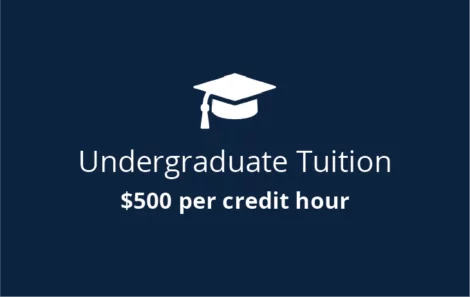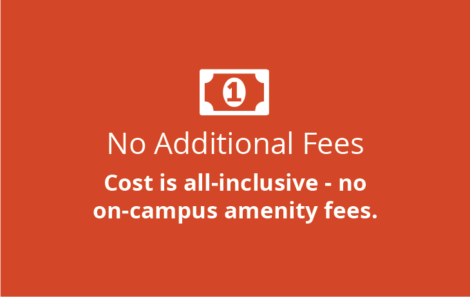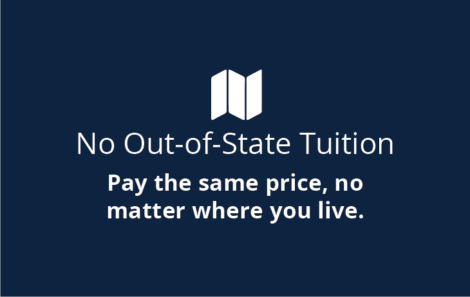
Develop and sharpen your communication skills while earning your B.A. in Communication. Explore digital media, public relations, intercultural and organizational communications, and prepare for a career in a multitude of industries.
By submitting this form, I agree that UTSA may contact me by email, voice, pre-recorded message and/or text message using automated technology.
Home / Programs / Communication
Coursework is offered fully online! You will work at your own pace to keep your work, life, and education in balance to graduate from a top-university.
A B.A. in Communication from UTSA Online opens the door to careers in a variety of industries. Through this comprehensive program, you’ll apply your writing, editing, research, and presentation talents to convey information to diverse audiences effectively and efficiently. These marketable skills will ensure that you remain highly valued by employers in many industries.
The Digital Communication concentration enables you to explore the industries of Digital Communication ranging from television and radio to computers and the Internet. With this concentration you will learn the processes of creating, producing, and distributing content in a variety of formats for digital platforms. You will study the principles of writing and producing for various audiences using technologies and methodologies of layout and graphic design, multimedia / video production, as well as theories and practices for strategic content creation for publishing digitally.
Public RelationsElevate your career prospects with our online Public Relations concentration at UTSA Online. Designed for modern learners, our program equips you with the essential skills needed to excel in the ever-evolving world of PR. Learn from seasoned industry professionals and engage in real-world projects.
From crafting persuasive messages to mastering the art of impactful content creation, our comprehensive curriculum ensures you’re ready for the PR industry’s demands. Join us to create your own Bold Future and make your mark in the realm of public relations.



Through this program, you’ll develop a highly marketable skill-set, which will allow you to seek a career in just about any industry.

Develop and sharpen your verbal, nonverbal, and written communication skill-set to prepare you for an exciting career in a multitude of sectors. Effective communication skills are prized by employers across a wide range of industries including, but not limited to:
The median salary for open communication-related positions in the United States as of May 2021 was $62,340.
Source: U.S. Bureau of Labor Statistics (BLS)
Sallye knew she needed to find a flexible program who would allow her to obtain her bachelor’s degree while managing her full-time job and her personal life. After researching different universities, she decided UTSA Online was the right choice for her. Watch her story to see how UTSA Online has made a huge impact in her life, and helped her continue building her BOLD Future.
To earn the Communication degree, you’ll complete 120 credit hours, including 42 core hours, 42 major hours, 6 language hours, 30 elective hours. See courses below:
COM 3023. Foundations of CommunicationAcquaints students with a range of disciplinary areas of study in communication. Addresses how communication influences our understandings of and in various social contexts and, in turn, how these understandings affect communicative choices. Addresses basic strategies and technologies used for information access, retrieval, and processing.
COM 3073. Conduct of Communication InquiryIntroduction to basic research methods as they apply to communication inquiry. Issues include applications of quantitative and qualitative research designs, descriptive and inferential statistics, and interpretation and critical evaluation of findings.
COM 3083. Language and Communication TheoryOverview of theories of language and communication. Focuses on understanding how language and communication affect individual and social action.
COM 2113. Public SpeakingTheory and practice of speaking in formal settings. Emphasis on preparation, adaptation, and delivery of oral and visual presentations, as well as written analysis of historical speeches. May be applied toward the Core Curriculum requirement in the Component Area Option.
COM 3553. Intercultural CommunicationExamination of differences in communication that arise from cultural and/or ethnic diversity. Emphasis on the verbal and nonverbal communicative patterns, conflict management, and decision-making processes of diverse cultures.
COM 4813. Theory and Practice of Social InteractionAdvanced study of one or more specific topics in social interaction, such as relational communication, intergroup communication, family communication, health communication, and/or conflict. This course fulfills the College of Liberal and Fine Arts Signature Experience.
You can add a Digital Communication or Public Relations concentration to your Communication degree. See the course description for each concentration below:
The courses in this concentration include:
The courses in this concentration include:
More Public Relations courses coming soon.
These marketable skills will ensure that you remain highly valued by employers in many industries.
Critical Thinking/Problem Solving:
Exercise sound reasoning to analyze issues, make decisions, and overcome problems. Students will be able to obtain, interpret, and use knowledge, facts, and data in this process, and may demonstrate originality and inventiveness.
Oral/Written Communications:
Articulate thoughts and ideas clearly and effectively in written and oral forms to persons inside and outside of the organization. The individual has public speaking skills; is able to express ideas to others; and can write/edit memos, letters, and complex technical reports clearly and effectively.
Global/Intercultural Fluency:
Value, respect, and learn from diverse cultures, races, ages, genders, sexual orientations, and religions. The individual demonstrates openness, inclusiveness, sensitivity, and the ability to interact respectfully with all people and understand individuals’ differences.
Teamwork/Collaboration:
Build strong, positive, and collaborative relationships with colleagues and customers across cultures, races, ages, genders, religions, lifestyles, and viewpoints to achieve common goals. Exercise the ability to compromise and be agile while employing your personal strengths, knowledge, and talents to complement those of others.
Technology:
Navigate change and quickly adapt to new and unfamiliar technologies. Learn to identify appropriate technology for completing specific tasks, and manage technology to integrate information to support relevant, effective, and timely decision-making.
Expand your skillset swiftly with UTSA’s microcredentials from Coursera Career Academy and Adobe Creative Skills. These streamlined educational experiences offer a quick path to acquiring new competencies recognized by a certificate or badge that carries weight in the job market and academia. Microcredentials are an ideal way to deepen your knowledge and refine your expertise alongside or beyond your degree.
Get Started with Coursera Get Started with Adobe
Tuition for the Online B.A. in Communication program is $500 per credit hour.
You may qualify for financial aid, including grants, loans, and scholarships. For eligibility, you must complete the Free Application for Federal Student Aid (FAFSA) for the applicable aid year. UTSA’s federal school code is 010115. You must complete a new application each year you are attending.
As a Military Friendly school, we offer many programs to support our students in the military, our veterans, and their families, while working closely with the UTSA Veterans Certification Office. Veterans and military families, please note that UTSA’s Online B.A. in Communication is not eligible for the Hazelwood Act benefit.
Because communication skills are so versatile, you’ll be able to seek a career in just about any industry. Top job titles for UTSA Communication graduates include:
Time-to-completion will vary based upon the number of previously earned credits that are eligible for transfer. If taking the full 120 credit hours required, it can take four to five years, depending on course load. With transfer credit, the time to graduation may be significantly less—possibly one to two years. The good news is that your Academic Advisor will help you customize your graduation plan.
Students who add a concentration in Digital Communication must complete the additional 5 courses for Digital Communication:
A maximum of 66 credit hours of lower division (freshman and sophomore) transfer work from a community college will be allowed to apply to a bachelor’s degree at UTSA. If you have exceeded the 66 hours of lower division work, the most applicable 66 credit hours will be applied to the degree you would like to earn. In order to earn a degree from UTSA Online, all students must successfully complete a minimum of 30 applicable credits at UTSA.
There is no maximum number of transferable hours from a four-year accredited institution. However, the applicability of the transfer coursework to the degree you would like to earn must be determined. Any coursework that does not correspond to courses offered by the university may transfer as elective credit.